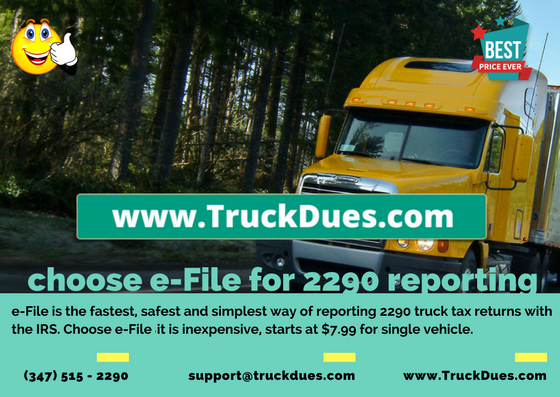 Federal law requires that you create an EIN for doing business as a truck owner. This fact is applicable even for truck owners who are apparently business owners by default. Federal law states that a tax payer must require an EIN before proceeding with few federal tax filings including the Form 2290, The Heavy Highway Used Tax Form.
Federal law requires that you create an EIN for doing business as a truck owner. This fact is applicable even for truck owners who are apparently business owners by default. Federal law states that a tax payer must require an EIN before proceeding with few federal tax filings including the Form 2290, The Heavy Highway Used Tax Form.
You can apply for an EIN either by filing an SS-4 application or by logging on to the IRS website https://www.irs.gov/businesses/small-businesses-self-employed/how-to-apply-for-an-ein.
Tips on Business Names:
When you complete the process to receive your EIN, and choose the type of business, you will also have the chance to choose a Doing Business As name, also referred to as a DBA name. While this name remains attached to the EIN, it is important to note that it is NOT the legal name of the entity.
Should you create an EIN as a sole proprietor, your name is the legal name of the entity. If you go through an incorporation process, the name on your papers of incorporation is the legal entity name. Be sure to use the legal entity name when filing tax forms, such as the heavy vehicle used tax form 2290.
Listing out your Business under the right category:
Most HVUT tax payer’s questions during creating their account with www.truckdues.com is
Under which category should I report my business?
I am an owner operator, I don’t own a business. What do I type in there on the business name section?
Types of businesses which basically encounters this scenario by far are as follows:
Sole Proprietor
Many owner/operators are sole proprietors. To be a sole proprietor, you do not have to do anything other than obtain your EIN. No paperwork, no legal fees to establish a legal entity, no stress over what type of business to be.
So why wouldn’t everyone do it this way? Sole proprietors remain personally liable for lawsuits files against their businesses. That means if you have an accident with a motorist, and they sue your business, in fact they are really suing you.
Also, sole proprietors pay taxes on the earnings from the business on their 1040, or personal tax form. You may find advantages in the other legal structures to minimize some of those taxes.
Limited Liability Company (LLC)
Yet another famous structure with owner/operators, the LLC creates a legal structure separate from the personal assets of the owner(s). LLCs also allow the debt from the business to be kept separate from personal obligations.
While that reduces the amount of stress you may have from fear of lawsuits or bankruptcy in your business harming your personal situation, the taxation remains similar to a sole proprietorship for a single owner. So the profit or losses of the business are the same as those of the owner.
In case if the LLC is formed by a group of partners, the taxation will resemble that of a partnership
Partnership
A partnership can be similar to either of the first two options above. You can enter into a partnership where each partner acts as a sole proprietor, or you can construct the partnership as an LLC.
Unless made under an LLC, a partnership does not provide relief from liability for lawsuits. The taxation of profits or losses goes on the 1040. Benefits of partnership include spreading some of the risk and combining the different skills of two or more owners to provide a better service or product to customers.
S Corporation:
An S corporation has shareholders. Like an LLC, an S corporation is an independent legal structure separate from the shareholders to separate personal assets from business assets. Owners must still report their income from the S corporation on their individual taxes, but in this case that eliminates the need to report them at the corporate level, preventing double taxation.
There are also certain requirements to qualify as an S corporation:
-
- Have only allowable shareholders.
- Have no more than 100 shareholders.
- Be a domestic corporation.
- Not be an ineligible corporation (i.e. certain financial institutions, insurance companies, and domestic international sales corporations).
C Corporation:
A C corporation shares similarities with an S corporation, but has a few important differences. There is no limit to the number of shareholders. The corporation also pays tax on the corporate profits, while shareholders pay tax on dividends or capital appreciation, should they sell their stock at a profit. Shareholder also may not deduct a loss based on their ownership of stock in a corporation that posts a loss.
Should you have any more questions than this, Please feel free to reach our support team @ (347) 515-2290 [9. AM through 5 PM, Central Standard Time including weekends and all major federal holidays] or write us: support@truckdues.com or Live chat with our support team for instant help.


 Did you ever encounter the moment when, just after it’s too late to do anything about it, you realize you messed something up? It’s always nice to know that you can go back and correct an error when you find one. In this article we are going to discuss on how to go about correcting an incorrect VIN that was accidentally reported over a Form 2290.
Did you ever encounter the moment when, just after it’s too late to do anything about it, you realize you messed something up? It’s always nice to know that you can go back and correct an error when you find one. In this article we are going to discuss on how to go about correcting an incorrect VIN that was accidentally reported over a Form 2290.  Many truckers and trucking companies’ ends up making an overpayment towards their HVUT Form 2290 taxes due to various reasons likely, they would have been into the conventional way of paper mailing the Physical Form stapled with a payment and receives the proof of payment back in mail in a fortnight, however this doesn’t seem to be a trouble until it costs any individual owner operators or trucking firms an immediate registration. So, many truckers who anticipates a response beck from the IRS out of paper mail ends up e-filing too so there comes an over payment of taxes by both mediums.
Many truckers and trucking companies’ ends up making an overpayment towards their HVUT Form 2290 taxes due to various reasons likely, they would have been into the conventional way of paper mailing the Physical Form stapled with a payment and receives the proof of payment back in mail in a fortnight, however this doesn’t seem to be a trouble until it costs any individual owner operators or trucking firms an immediate registration. So, many truckers who anticipates a response beck from the IRS out of paper mail ends up e-filing too so there comes an over payment of taxes by both mediums. 

 E-filing has emerged to be one of the modern revolutions which help the tax payers to securely file & pay their Federal Excise Tax Returns with the Internal Revenue Service. The primary reason for introducing E-filing is to lessen the burden of a tax payer during their tax deadline. It puts them aside off scheduling appointments at the local IRS facility and sparing a day’s time to have your turn arrived before you reach the counter. Guess the worst part, any last moment corrections are not honored else than starting all over again. Instead sit back, relax and e-file your Form 2290 through www.truckdues.com in matter of minutes.
E-filing has emerged to be one of the modern revolutions which help the tax payers to securely file & pay their Federal Excise Tax Returns with the Internal Revenue Service. The primary reason for introducing E-filing is to lessen the burden of a tax payer during their tax deadline. It puts them aside off scheduling appointments at the local IRS facility and sparing a day’s time to have your turn arrived before you reach the counter. Guess the worst part, any last moment corrections are not honored else than starting all over again. Instead sit back, relax and e-file your Form 2290 through www.truckdues.com in matter of minutes.  Hey there truckers, Hope you are reading this article with high spirits this New Year. No wonder misconception might arise within yourself due to our repeated HVUT deadline alerts. We are not trying to mock you with repeated deadline alerts. Federal law states that HVUT Form 2290 must be filed on a Vehicle by the last day of the month following the month of its first use.
Hey there truckers, Hope you are reading this article with high spirits this New Year. No wonder misconception might arise within yourself due to our repeated HVUT deadline alerts. We are not trying to mock you with repeated deadline alerts. Federal law states that HVUT Form 2290 must be filed on a Vehicle by the last day of the month following the month of its first use.  The Form 2290 HVUT tax returns are due by the end of this month for vehicles that are into service beginning December 2017. Penalties for HVUT non-compliance are serious money; it is equal to 4.5 percent of total tax due, assessed on a monthly basis up to five months. Late filers who don’t make an HVUT payment also face an additional monthly penalty equal to 0.5 percent of total tax due. Additional interest charges of 0.54 percent per month accumulate as well.
The Form 2290 HVUT tax returns are due by the end of this month for vehicles that are into service beginning December 2017. Penalties for HVUT non-compliance are serious money; it is equal to 4.5 percent of total tax due, assessed on a monthly basis up to five months. Late filers who don’t make an HVUT payment also face an additional monthly penalty equal to 0.5 percent of total tax due. Additional interest charges of 0.54 percent per month accumulate as well.  Federal law requires that you create an EIN for doing business as a truck owner. This fact is applicable even for truck owners who are apparently business owners by default. Federal law states that a tax payer must require an EIN before proceeding with few federal tax filings including the Form 2290, The Heavy Highway Used Tax Form.
Federal law requires that you create an EIN for doing business as a truck owner. This fact is applicable even for truck owners who are apparently business owners by default. Federal law states that a tax payer must require an EIN before proceeding with few federal tax filings including the Form 2290, The Heavy Highway Used Tax Form. New Year is right around the corner. Many people hold parties at home or attend special celebrations to celebrate the upcoming New Year. In many cities, large scale public events are held. So it is always be a good feeling for us to be among the crowd during gatherings for an occasion like New Year. Witness a Parade to feel more live and enthusiastic.While you could find a New Year’s Eve party nearly anywhere you go, some cities definitely do it better than others. You may certainly consider check these below celebrations out.
New Year is right around the corner. Many people hold parties at home or attend special celebrations to celebrate the upcoming New Year. In many cities, large scale public events are held. So it is always be a good feeling for us to be among the crowd during gatherings for an occasion like New Year. Witness a Parade to feel more live and enthusiastic.While you could find a New Year’s Eve party nearly anywhere you go, some cities definitely do it better than others. You may certainly consider check these below celebrations out.